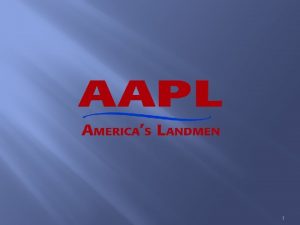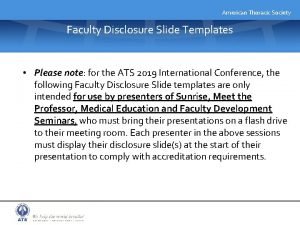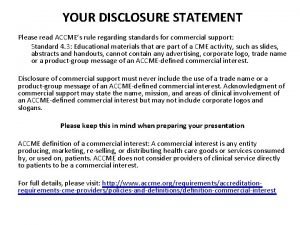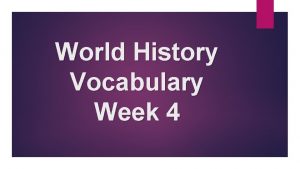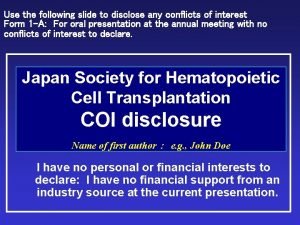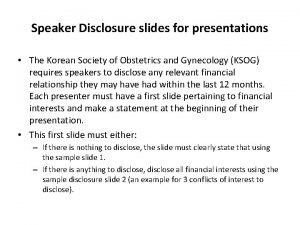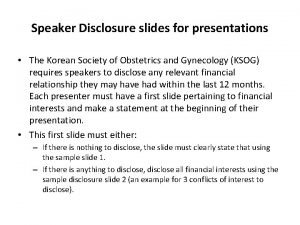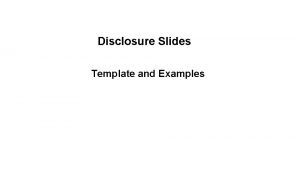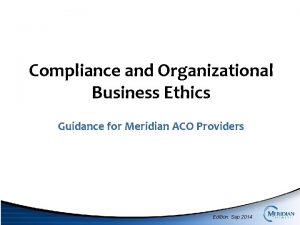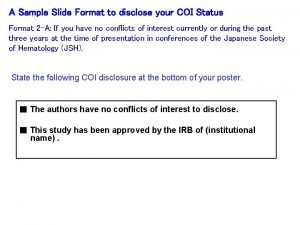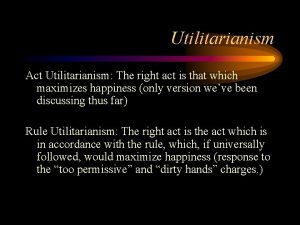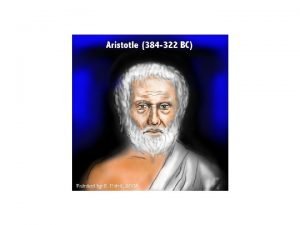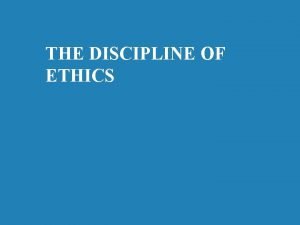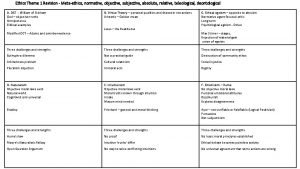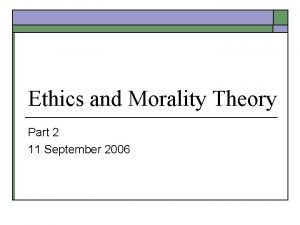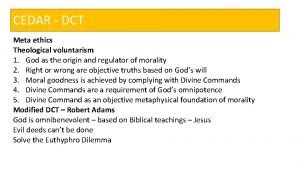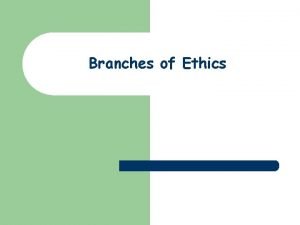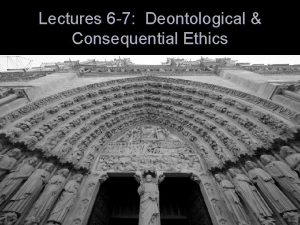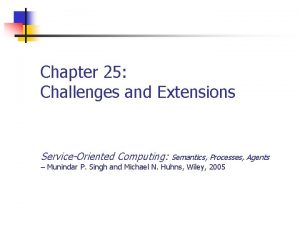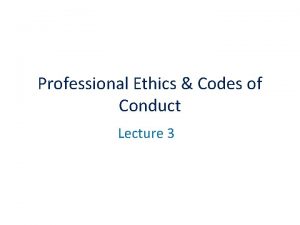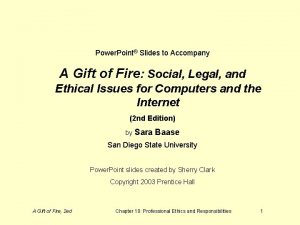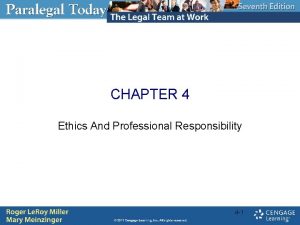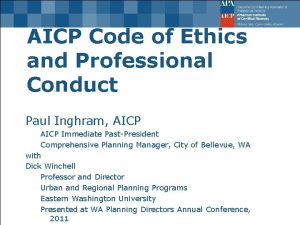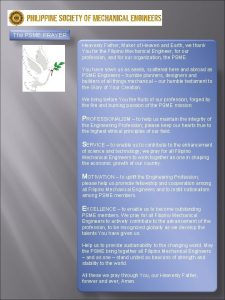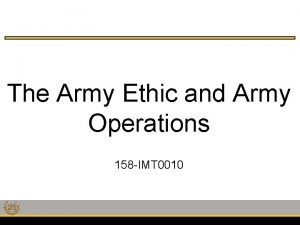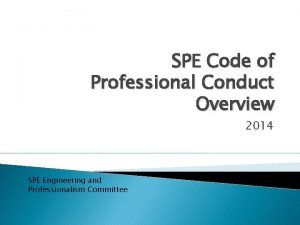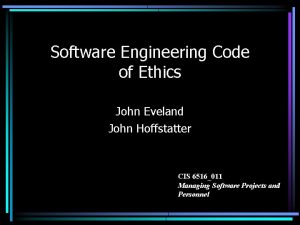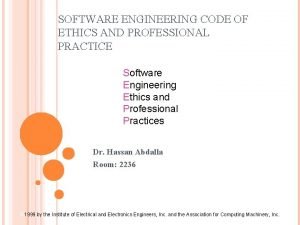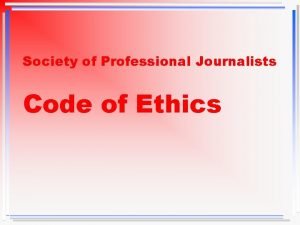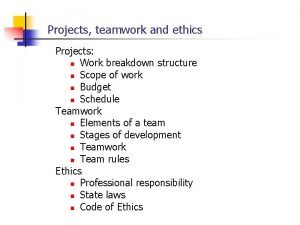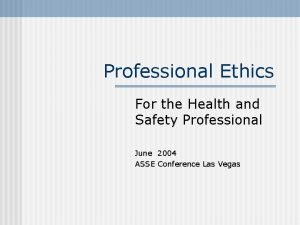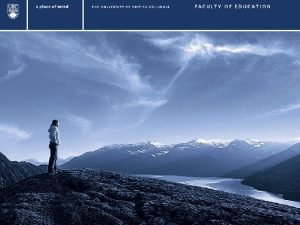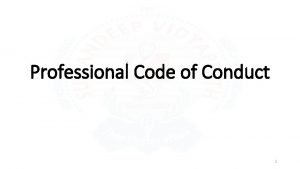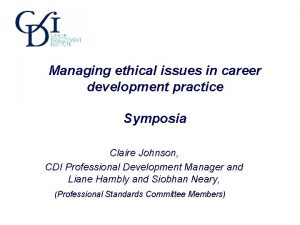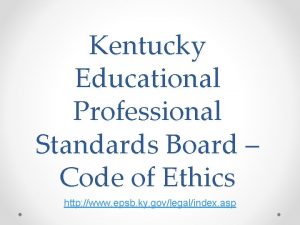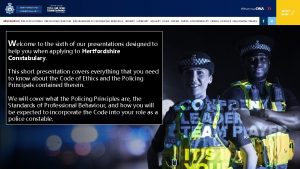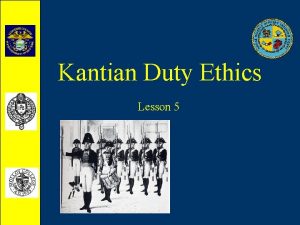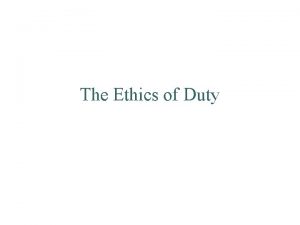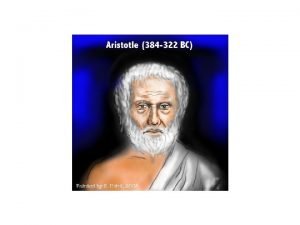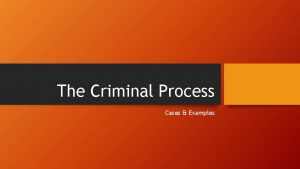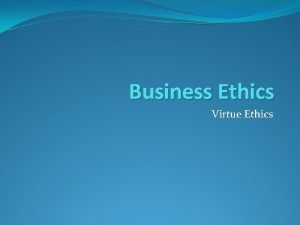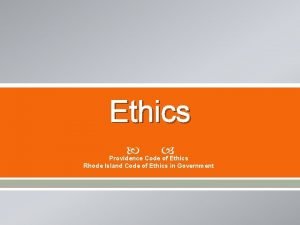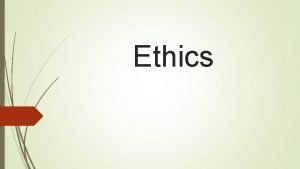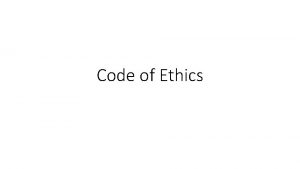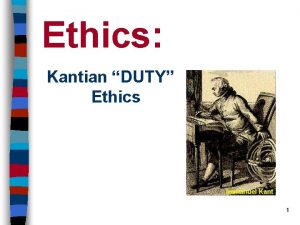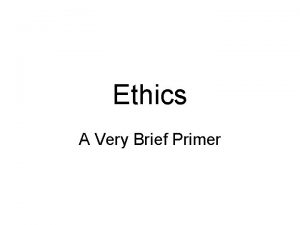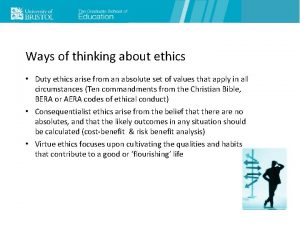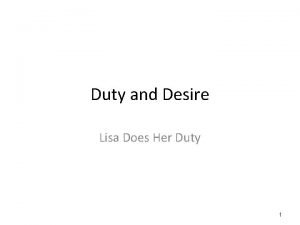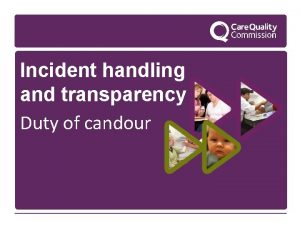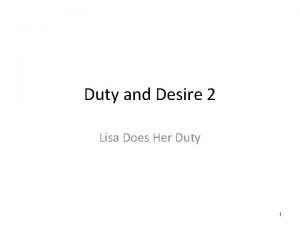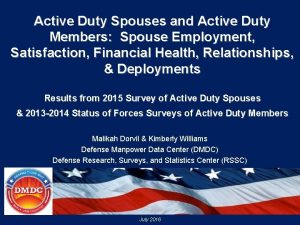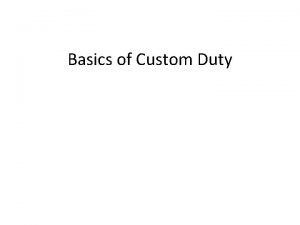AAPL CODE OF ETHICS AND DUTY TO DISCLOSE














































- Slides: 46

AAPL CODE OF ETHICS AND DUTY TO DISCLOSE JANUARY 8, 2018 OCAPL EDUCATIONAL LUNCH

AAPL CODE OF ETHICS AND BEST PRACTICES OF LANDMEN Duty of Personal Conduct Duty to the Public AGENDA ETHICIAL CONSIDERATIONS IN CONTRACT NEGOTIATIONS What constitutes a contract? Problems that arise in contract negotiations OKLAHOMA CASE LAW EXAMPLE SCENARIOS AND CONCLUDING COMMENTS

AAPL CODE OF ETHICS The Code of Ethics shall be the basis of conduct, business principles and ideals for the members of the AAPL; and it shall be understood that conduct of any member of the AAPL inconsistent with the provisions set forth in this Article shall be considered unethical and said individual’s membership status shall be subject to review for possible disciplinary action as prescribed in Article XVII of these Bylaws. In the area of human endeavor involving trading under competitive conditions, ethical standards for fair and honest dealing can be made increasingly meaningful by an association organized and dedicated not only to the definition, maintenance, and enforcement of such standards, but to the improvement and education of its members as set out in the Standards of Practice. Such is the objective of AAPL and such is its public trust.

AAPL CODE OF ETHICS (CONT. ) Section 1. It shall be the duty of the Land Professional at all times to promote and, in a fair and honest manner, represent the industry to the public at large with the view of establishing and maintaining goodwill between the industry and the public and among industry parties. The Land Professional, in his dealings with landowners, industry parties, and others outside the industry, shall conduct himself in a manner consistent with fairness and honesty, such as to maintain the respect of the public.

AAPL CODE OF ETHICS (CONT. ) Section 2. Competition among those engaged in the mineral and energy industries shall be kept at a high level with careful adherence to established rules of honesty and courtesy. A Land Professional shall not betray his partner’s, employer’s, or client’s trust by directly turning confidential information to personal gain. The Land Professional shall exercise the utmost good faith and loyalty to his employer (or client) and shall not act adversely or engage in any enterprise in conflict with the interest of his employer (or client). Further, he shall act in good faith in his dealings with the industry associates. The Land Professional shall represent others only in his areas of expertise and shall not represent himself to be skilled in professional areas in which he is not professionally qualified.

AAPL BEST PRACTICES OF LAND PROFESSIONAL Be informed regarding laws, proposed legislation, governmental regulations, public policies and current market conditions in their area of represented expertise in order to be in a position to advise their employer or client properly. Protect the members of the public with whom they deal against fraud, misrepresentation and unethical practices. Eliminate any practices which could be damaging to the public or bring discredit to the petroleum, mining or environmental industries.

AAPL BEST PRACTICES OF LAND PROFESSIONAL (CONT. ) In accepting employment, the land professional pledges to protect and promote the interests of their employer or client. This obligation of absolute fidelity to the employer's or client's interest is primary, but it does not relieve the land professional of their obligation to treat fairly all parties to any transaction or act in an ethical manner. Not deny equal professional services to any person for reasons of race, creed, sex or country of national origin nor be a party to any plan or agreement to discriminate against a person or persons on the basis of race, creed, sex or country of national origin. Provide a level of competent service in keeping with the standards of practice in those fields in which a land professional customarily engages.

AAPL BEST PRACTICES OF LAND PROFESSIONAL (CONT. ) Not represent themselves to be skilled in nor shall he or she engage in professional areas in which they are not qualified, such as the practice of law, geology, engineering or other disciplines. Not undertake to provide professional services concerning a property or a transaction where one has a present or contemplated interest, unless such interest is specifically disclosed to all affected parties. Place all pertinent facts before the proper authority of the American Association of Professional Landmen if charged with unethical practice or is asked to present evidence in any disciplinary proceeding or investigation, or has direct knowledge of apparent unethical misconduct of another member.

AAPL BEST PRACTICES OF LAND PROFESSIONAL (CONT. ) Assure that monies coming into their possession in trust for other persons, such as escrows, advances for expenses, fee advances and other like items, are properly accounted for and administered in a manner approved by the employer or client. At all times present an accurate representation in his advertising and disclosures to the public. Not aid or abet the unauthorized use of the title "Certified Professional Landman, " "Registered Professional Landman, " “Registered Landman, "P. Land" and "CPL/ESA. " Not participate in conduct which causes them to be convicted, adjudged or otherwise recorded as guilty by any court of competent jurisdiction of any felony, any offense involving fraud as an essential element or any other serious crime.

ETHICAL CONSIDERATIONS IN CONTRACT NEGOTIATIONS Contracts can come in many forms: Oil and Gas Leases Surface Damage Agreements Purchase and Sale Agreements Right of Ways Etc.

ETHICAL CONSIDERATIONS IN CONTRACT NEGOTIATIONS(CONT. ) WHAT CONSTITUTES A CONTRACT? Offer Acceptance Consideration Mutuality of Obligation Competency and Capacity

ETHICAL CONSIDERATIONS IN CONTRACT NEGOTIATIONS(CONT. ) OTHER CONSIDERATIONS SURROUNDING CONTRACTS: Need not be in writing, except in certain circumstances. But… Best policy is to always have a contract in writing Contracts should give each party what they bargained for, or problems arise. For example: Consideration not paid One party takes advantage of the other through misrepresentation

ETHICAL CONSIDERATIONS IN CONTRACT NEGOTIATIONS(CONT. ) Code of Ethics, Section 1: It shall be the duty of the Land Professional at all times to promote and, in a fair and honest manner, represent the industry to the public at large with the view of establishing and maintaining goodwill between the industry and the public and among industry parties. The Land Professional, in his dealings with landowners, industry parties, and others outside the industry, shall conduct himself in a manner consistent with fairness and honesty, such as to maintain the respect of the public.

ETHICAL CONSIDERATIONS IN CONTRACT NEGOTIATIONS(CONT. ) Best Practices: Protect the members of the public with whom they deal against fraud, misrepresentation and unethical practices.

ETHICAL CONSIDERATIONS IN CONTRACT NEGOTIATIONS(CONT. ) Before jumping into cases dealing with oil and gas transactions and allegations of fraud or misrepresentation, remember: Some activity might violate the Code of Ethics without constituting fraud Code of Ethics is a higher bar than certain legal tests for determining fraud, misrepresentation, etc. Great bargain might be “legal” but still violate Code of Ethics Sections 1 and 2 if Landman acts in a way that harms the goodwill between the industry and the public and diminishes the respect of the public. For example: Withholding information from a landowner and paying less than the going rate in the area, especially in circumstances where the landowner is in financial trouble or poorly educated/informed.

OKLAHOMA CASE LAW Berry v. Stevens, 1934 OK 167, 31 P. 2 d 950. Facts: Action for rescission and cancellation of a deed. Berry owned a mineral interest in Caddo County in an area that had known production from shallow wells. Berry offered to sell his interest to Stevens if he could receive $2, 500. 00 for the interest. Stevens knew that a deep formation had been tested and a well came in at an initial rate of 1, 000 bpd only days earlier. Stevens knew that Berry was desperate to sell. Stevens and Berry engaged in discussion of the area, including production. While Stevens offered information about the area, he failed to mention the new well.

OKLAHOMA CASE LAW (BERRY V. STEVENS) Analysis and Discussion: Generally, you are not required to disclose all information you may have, but the Supreme Court reversed the trial court judgment in favor of Stevens and stated that while a party has no duty to speak, if one undertakes to speak, one must tell the truth and not suppress known facts as half truths calculated to deceive and representations literally true but used to create a false impression are false representations. "A duty to speak may arise from partial disclosure, the speaker being under a duty to say nothing or to tell the whole truth. One conveying a false impression by the disclosure of some facts and the concealment of others is guilty of fraud, even though his statement iv true as far as it goes, since such concealment Is in effect a false representation that what is disclosed is the whole truth. " 26 C. J. 1074, par. 17.

OKLAHOMA CASE LAW (BERRY V. STEVENS) Takeaway: The buyer was under no obligation to reveal his knowledge of the new well and resultant increase of value in the area. The buyer did not actively misinform the seller, and there is no indication that the seller asked specific questions about the area that the buyer misled the seller. But, the court noted that once the buyer engaged in discussion about the area, a duty arose to make full disclosure.

OKLAHOMA CASE LAW Deardorf v. Rosenbusch 1949 OK 117, 206 P. 2 d 996 Facts: Ms. Rosenbusch lived in Washington D. C. and had no knowledge of the oil and gas business. In 1934 she purchased a one-acre mineral interest in Oklahoma County for $350. 00. The property was undeveloped at the time. There was later production, of which Deardorf was aware. Deardorf contacted her by letter and offered to buy the interest explaining that he was attempting to clear title to a farm and offered $10 for her one-acre non-producing interest. A quitclaim deed was enclosed. Plaintiff signed and enclosed the quitclaim deed with a letter that stated in part, “…The sum, $10. 00, seems rather small, which you offer, for the $350. 00 I paid in 1934… I have been loth to relinquish for so little, that which cost me so much; but as I am nearing my eightieth year there can be little time to benefit from any returns…”

OKLAHOMA CASE LAW (DEARDORF V. ROSENBUSCH) Analysis and Discussion: Defendants contended they did nothing to mislead the mineral owner. The trial court granted judgment for the mineral owner. Oklahoma Supreme Court affirmed the decision of the trial court, stating that: “…to confirm as true another's false impression concerning a material fact is no less a false representation of such fact than if made directly in order to create the false impression. The fact that there was production was the moving cause of defendant's seeking the conveyance. The absence of plaintiff's knowledge of the production was relied on as an inducement to plaintiff's executing the conveyance for a nominal consideration. There is no need to weigh the value of each of the several statements in the letter when it is manifest that the letter as a whole is expressive of a scheme to capitalize on the ignorance of another. Instead of disclosing the truth of there being production the same was sought to be concealed from the plaintiff by indirectly if not directly creating the belief if it did not exist, or confirming as true, if it did exist, plaintiff's belief that the land was nonproductive. The holding of the trial court that the deed was obtained by fraud finds full support in the evidence. ”

OKLAHOMA CASE LAW (DEARDORF V. ROSENBUSCH) Takeaway: The buyer failed to reveal the fact of production after creating the false impression that the interest was non-productive. The original solicitation letter referred to the fact that Ms. Rosenbusch had purchased a non-producing interest in 1934 and that the offer to purchase was part of an attempt to clear title. This created the false impression that the interest had little or no worth.

OKLAHOMA CASE LAW Uptegraft v. Dome Petroleum Corp. 1988 OK 129, 764 P. 2 d 1350 Facts: The Uptegrafts obtained title to 2% leasehold interest in lands in Logan County from Ferguson Oil & Gas. Ferguson assigned the remainder of the leasehold to other parties including Dome Petroleum Corporation. Atlas Oil Inc. approached Dome about developing the prospect and Dome executed a farmout to Atlas completed 2 wells on the acreage in April 1981 shortly before expiration of the leases on those tracts. Both wells were commercially productive.

OKLAHOMA CASE LAW (UPTEGRAFT V. DOME PETROLEUM CORP. ) After the wells were completed Dome contacted the Uptegrafs by letter dated May 18, 1981. The letter stated in part: Dome has recently agreed to a checkerboard farmout to Atlas Drilling Company. A copy of the Farmout Agreement is enclosed for your review. Advantages to Dome, and our various partners are, evaluation of production in those units Atlas drills, and protection of leases which would have expired before we could have drilled in this area. To indicate inclusion of your working interest in the Farmout Agreement please execute two (2) copies of this letter and return them to the undersigned. Prompt attention will be appreciated due to lease expiration.

OKLAHOMA CASE LAW (UPTEGRAFT V. DOME PETROLEUM CORP. ) The Uptegrafts agreed to the farmout and later learned that the 2 productive wells had been drilled and completed prior to their execution of the farmout, and that Dome was aware of the completion of the wells and failed to inform them.

OKLAHOMA CASE LAW (UPTEGRAFT V. DOME PETROLEUM CORP. ) Analysis and Discussion: On appeal, the Supreme Court held that the letter from Dome was misleading by failing to inform the Uptegrafs of current production, by stating an advantage in evaluation by drilling and protection of leases that were about to expire. The leases had already been evaluated by drilling and were extended by production. The Court stated the rule that: “Although a party may keep absolute silence and violate no rule of equity, yet, if he volunteers to speak and to convey information which may influence the conduct of the other party, he is bound to disclose the whole truth. ”

OKLAHOMA CASE LAW (UPTEGRAFT V. DOME PETROLEUM CORP. ) Takeaway: This case reminds us that there is no general requirement to divulge all knowledge, but once you convey information that can change. Dome misled the Uptegrafs about production.

OKLAHOMA CASE LAW Silk v. Phillips Petroleum Co. , 1988 OK 93, 760 P. 2 d 174. Facts: Although reported in 1988, the events took place in 1975. At the time, nearly all leases were uniform and did not contain all the special provisions that we see today. Phillips engaged a broker and provided him with lease forms that contained a provision for option to renew clause. The lease was for a 5 -year primary term with an option to renew at the same price as the original term.

OKLAHOMA CASE LAW (SILK V. PHILLIPS PETROLEUM CO. ) The broker met with the mineral owner regarding leasing her mineral interest in Section 28. The mineral owner told the broker she would be interested in leasing on the same terms as she had received in a different section in the area. That lease was a straight 5 -year term at $35 an acre with no option to renew. The broker came back a few days later with the printed forms. The mineral owner testified she thought the parties had agreed to terms in the earlier meeting and there was no discussion this time. She just signed the forms. She said the broker never mentioned the option to renew. Thus, this was theory advanced – that the prior meeting resulted in an oral agreement and the signed lease was inconsistent with the oral agreement.

OKLAHOMA CASE LAW (SILK V. PHILLIPS PETROLEUM CO. ) Analysis and Discussion: Since oral discussions and agreements are merged into the final signed document, the executed document will control unless the signature was obtained through fraud or mutual mistake. The mineral owner admitted she never asked to review the form before signing it. But, she claimed that failure to mention the clause amounted to fraudulent inducement. Her theory was based on the claim that since the broker never mentioned the clause he impliedly represented that the form was the same as the prior oral agreement. This argument failed because the broker did not make any representations about the form. If the broker had stated, “this form is consistent with our discussions, ” the court may have found fraud.

OKLAHOMA CASE LAW (SILK V. PHILLIPS PETROLEUM CO. ) Analysis and Discussion: Mineral owner claimed that the broker concealed the option provision from her, thus preventing her from inspecting or reading it. She signed a printed lease, a printed option to renew clause and a printed rental division order. She testified that the option to renew was not taped to the lease form at the time she signed it. Apparently it was later taped to the bottom of the lease form and filed of record. She testified that the broker presented the lease form that she signed where directed and he then pulled the option clause and the Rental Division Order from his briefcase and directed her to sign those, which she did. Thus, she claimed he tricked her into signing the document. Critically, there was no evidence that the broker prevented her from reading the forms.

OKLAHOMA CASE LAW (SILK V. PHILLIPS PETROLEUM CO. ) Analysis and Discussion: Mineral owner claimed that the alleged failure of the broker to inform her of the existence of the option, after having undertaken the duty of informing her of the terms of the lease, constituted fraud. The question is whether the broker had a duty to disclose to the mineral owner the existence of the option, so that failure to disclose constituted misrepresentation of a material fact. Silence as to a material fact is not necessarily a false representation, unless there was an obligation to speak. Such an obligation might arise if the mineral owner asked questions regarding the form. There must first be a duty to speak before failure to do so constitutes fraud.

OKLAHOMA CASE LAW (SILK V. PHILLIPS PETROLEUM CO. ) Takeaway: There must first be a duty to speak before failure to do so constitutes fraud. Fraud must be proved by clear and convincing evidence. Question: What if she had questioned him about the form and he misled her?

OKLAHOMA CASE LAW Crosslin v Enerlex, 2013 OK 34, 308 P. 3 d 1041. Facts: W. M. Croslin owned a four net acre mineral interest in Seminole County, Oklahoma. He died on September 24, 1994, survived by his wife and his children. W. M. Croslin's unleased mineral interest was included in an Oklahoma Corporation Commission pooling order in 2000. Mr. Crosslin’s wife died in 2005, survived by her children. In early 2008, nearly $10, 000. 00 had accrued from the production of the unleased mineral interest under the pooling order and had been reported and transmitted to the State of Oklahoma for the benefit of W. M. Croslin pursuant to the statutory custodial taking of proceeds from pooled mineral interests owned by unknown or unlocated persons.

OKLAHOMA CASE LAW (CROSSLIN V ENERLEX) Enerlex was aware of the accrued funds and offered to buy the mineral interest from the Crosslin heirs. Enerlex sent an offer letter to each heir, advising that it was "purchasing mineral interests in Seminole County, Oklahoma" and that "we believe you own" a mineral interest in Seminole County. The letter also advised that two bank drafts totaling $1, 350. 00, a mineral deed, and a self-addressed envelope were enclosed; that "when the Mineral Deed has been received by our office, we will begin our title examination"; and that the drafts will "be paid upon completion of the title examination. " In making the offers, defendant did not disclose to any of the plaintiffs the existence of the pooling order or the accrued mineral proceeds held by the State Treasurer. The language that followed the granting clause in the deeds explained its meaning:

OKLAHOMA CASE LAW (CROSSLIN V ENERLEX) it being understood and agreed that this transfer and assignment covers and includes that the grantee shall have, receive, and enjoy the herein granted undivided interests in and to all royalties, accruals and other benefits, if any, from all Oil and Gas heretofore or hereafter run, whether they be held therefore by any purchaser or other legal entity, or hereafter produced, sold and paid to the Grantee. The Grantor hereby irrevocably appoints and constitutes the Grantee as agent and attorney-in-fact for the limited purpose only of executing division and transfer orders and all other instruments necessary to make fully effective this assignment and conveyance so that the Grantee may act in Grantor's place and stead for such purpose.

OKLAHOMA CASE LAW (CROSSLIN V ENERLEX) The Croslin heirs executed the deeds and later discovered the pooling order and accrued mineral proceeds and filed suit against Enerlex. The Croslin heirs contended that Enerlex had a duty to inform them of the existence of the pooling order and accrued proceeds and that failure to inform them constituted fraud.

OKLAHOMA CASE LAW (CROSSLIN V ENERLEX) Analysis and Discussion: The trial court granted summary judgment in favor of the Croslin heirs finding that a mineral interest purchaser has the duty to disclose production and failure to do so is a false representation citing Deardorf v. Rosenbusch. The court also ruled the unclaimed property statutes and regulations place additional notice requirements upon one who claims funds in the Mineral owners Escrow Fund based upon the transfer of a mineral interest (Note: the relevant statutes are 52 O. S. 2011, §§ 551 -558). Upon appeal the Court of Appeals reversed the trial court finding the defendant made no factual inducement, representation or misrepresentation that gave rise to a duty to disclose, and had no duty to disclose under the unclaimed property statutes.

OKLAHOMA CASE LAW (CROSSLIN V ENERLEX) Analysis and Discussion: On appeal to the Supreme Court of Oklahoma, the Supreme Court noted that “…fraud is a generic term embracing the multifarious means which human ingenuity can devise so one can get advantage over another by false suggestion or suppression of the truth. ”

OKLAHOMA CASE LAW (CROSSLIN V ENERLEX) Analysis and Discussion: The Supreme Court discussed the principles set out in the Deardorf opinion as follows: 1) where there is no duty to speak, if a person undertakes to speak, he or she must disclose all known facts; 2) where the speaker is under a duty to say nothing or to tell the whole truth, a duty to tell the whole truth may arise from partial disclosure; and 3) one conveying a false impression by disclosing some facts and concealing others is guilty of fraud, even though the statement is true as far as it goes, the concealment is in effect a false representation that what is disclosed is the whole truth.

OKLAHOMA CASE LAW (CROSSLIN V ENERLEX) Takeaway: Underlying purposes of the statutory scheme are to assure that mineral proceeds of unknown and unlocated property owners will be protected. “The policy of the courts to favor the unwary rather than the crafty…remains intact. ” Question: Did defendant owe the plaintiffs a duty to disclose the pooling order and the accrued mineral proceeds when it made an unsolicited offer to purchase their undivided mineral interest in Seminole County and provided the mineral deeds to be executed?

SUMMATION OF DUTY OF DISCLOSURE Stevens - while a party has no duty to speak, if he or she undertakes to speak, he or she must tell the truth and not suppress known facts. “Say nothing or tell the whole truth. ” Deardorf - confirming as true another's false impression concerning a material fact is no less a false representation of such fact than if made directly in order to create the false impression. Uptegraft - “Although a party may keep absolute silence and violate no rule of equity, yet, if he volunteers to speak and to convey information which may influence the conduct of the other party, he is bound to disclose the whole truth. ”

SUMMATION OF DUTY OF DISCLOSURE (CONT. ) Silk – Broker’s non-response to mineral owner’s statement that she presumed the lease terms would be the same as other section seems a lot like Deardorf – “confirming as true another's false impression concerning a material fact is no less a false representation of such fact than if made directly in order to create the false impression. I suspect the difference is the facts were not in dispute in Deardorf and probably were in Silk. In other words the broker probably did not admit that Silk made that statement. While we don’t have the transcripts of testimony, it is noteworthy that the court made a point of stating that fraud must be established by clear and convincing evidence. This suggests that facts were in dispute.

SUMMATION OF DUTY OF DISCLOSURE (CONT. ) Crosslin v Enerlex – Similar to Deardorf. “Although a party may keep absolute silence and violate no rule of law or equity, and yet, if he or she volunteers to speak and to convey information which may influence the conduct of the other party, he or she is bound to disclose the whole truth. ” The “if any” language in the deed was deemed to be volunteering to speak and conveying information – it gave the impression that there were no proceeds – and therefore a duty arose to disclose the whole truth.

FINAL THOUGHTS AND DISCUSSION The Code of Ethics requires a very high standard of conduct. Even in situations where there may not be fraud under existing case law, actions that fall short of “fair and honest manner” and are not “in a manner consistent with fairness and honesty” would run afoul of the Code of Ethics and could result in expulsion from the AAPL. The goal of the Code is to protect the integrity of the profession. You are not required to reveal company strategy or share proprietary geological information. You simply cannot mislead. Remember that a contract is intended to be fair to both parties. Questions?

CONTACT INFORMATION Download a copy of this Power. Point at: www. ballmorselowe. com/OCAPL BALLMORSELOWE. COM 405. 701. 5355 DAVID: DMORSE@BALLMORSELOWE. COM PARKER: PLOWE@BALLMORSELOWE. COM ZACH: ZBALL@BALLMORSELOWE. COM

 Aapl accredited schools
Aapl accredited schools Bigcharts aapl
Bigcharts aapl Aaos disclosure slide
Aaos disclosure slide Accmes
Accmes Morphology synonym
Morphology synonym Nothing to disclose slide
Nothing to disclose slide Disclosure slide
Disclosure slide No disclosure slide
No disclosure slide Disclosure slide example
Disclosure slide example You must disclose your name when calling the complyline.
You must disclose your name when calling the complyline. Coi format
Coi format Nothing to disclose
Nothing to disclose Duty ethics example
Duty ethics example Utilitarianism rule
Utilitarianism rule Ethical virtues
Ethical virtues What is duty ethics
What is duty ethics Busceral
Busceral Compare micro-ethics and macro-ethics.
Compare micro-ethics and macro-ethics. Descriptive ethics
Descriptive ethics Normative ethical questions
Normative ethical questions Factual inquiry in ethics
Factual inquiry in ethics Metaethics vs normative ethics
Metaethics vs normative ethics Descriptive ethics vs normative ethics
Descriptive ethics vs normative ethics Discipline
Discipline Meta ethics vs normative ethics
Meta ethics vs normative ethics 2 branches of ethics
2 branches of ethics Teleological ethics vs deontological ethics
Teleological ethics vs deontological ethics Teleological ethics vs deontological ethics
Teleological ethics vs deontological ethics Acm code of ethics and professional conduct
Acm code of ethics and professional conduct Cips code of ethics and professional conduct
Cips code of ethics and professional conduct Nala paralegal canons of ethics
Nala paralegal canons of ethics Aicp code of ethics
Aicp code of ethics Psme code of ethics
Psme code of ethics Consolidation of gains
Consolidation of gains Aasw code of ethics
Aasw code of ethics Spe code of ethics
Spe code of ethics Software engineering code of ethics
Software engineering code of ethics Code of ethics for software engineers
Code of ethics for software engineers Code of ethics society of professional journalists
Code of ethics society of professional journalists Society of competitive intelligence professionals
Society of competitive intelligence professionals Teamwork code of ethics
Teamwork code of ethics Asse code of conduct
Asse code of conduct Bctf code of ethics
Bctf code of ethics Code of conduct professional ethics
Code of conduct professional ethics Holly forester miller
Holly forester miller Kentucky teacher code of ethics
Kentucky teacher code of ethics 9 policing principles code of ethics
9 policing principles code of ethics
